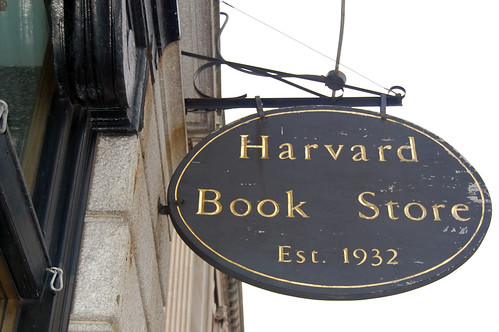I’m very lucky to live within walking distance of Harvard Bookstore, one of my favorite bookstores on earth. The fact that it’s an independent bookstore is just icing on the cake—the store is just wonderful, with a great staff, and in a decade I’ve never once succeeded in visiting without spending a half-hour or more there.
So I was thrilled to see Forbes recognizing the success of Harvard Bookstore and its owner, Jeff Mayersohn. The title of the article—“The Man Who Took on Amazon and Saved a Bookstore”—reminds you how hard it is to run an indie bookstore these days, and author (and fellow Cantabridgian) Phil Johnson outline one key way Harvard bookstore adapted to compete in the digital age:
Making an intuitive leap, Jeff wondered if the opposite could be true? Maybe access to the vast universe of digital content could also save the bookstore. Maybe the bookstore, while limited in inventory, could evolve in the digital world and become a destination where people had access to every digitized book ever published. […]
Essentially, Jeff installed a printing press to close the inventory gap with Amazon. The Espresso Book Machine sits in the middle of Harvard Book Store like a hi-tech visitor to an earlier era. A compact digital press, it can print nearly five million titles including Google Books that are in the public domain, as well as out of print titles. We’re talking beautiful, perfect bound paperbacks indistinguishable from books produced by major publishing houses. The Espresso Book Machine can be also used for custom publishing, a growing source of revenue, and customers can order books in the store and on-line.
You can walk into the store, request an out-of-print, or hard-to-find title, and a bookseller can print that book for you in approximately four minutes. Ben Franklin would be impressed.
I’ve long admired the book-printing machine, punnily nicknamed Paige M. Gutenborg. But Harvard Bookstore is offering yet another reader-focused service that I have to try soon: the book delivery service, with same-day delivery service in Cambridge via bicycle. And these strategies seem to be working—according to Forbes, the store has had “double digit sales growth month by month over the last year.”
It’s not Amazon, and it won’t replace Amazon, as the article readily admits. But by adapting to its niche, could Harvard Bookstore lead the way for indie booksellers?
Further Reading:
- Harvard Bookstore also isn’t shy about taking a stand against people browsing in person, then buying online.






